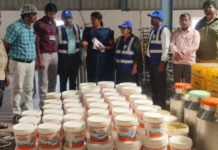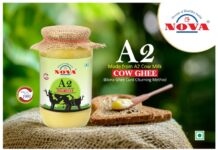Amul, a well-established name in the dairy industry, is currently making strides as it ventures into innovative product lines in the ice cream segment.
In an exclusive interview with Moneycontrol, Jayen Mehta, Managing Director of Gujarat Cooperative Milk Marketing Federation (GCMMF), Amul’s parent company, discussed expansion plans, their commitment to innovation, the Ice Lounge concept, biogas initiatives, and a diverse range of innovative dairy products.
Mehta highlighted Amul’s unwavering commitment to its cooperative origins, aiming to provide value to both farmers and consumers. The company’s emphasis on quality and trust remains at the forefront of its mission, he said, adding this will ensure a continued legacy of success in the ever-evolving food industry.
Ice Lounge expansion
Mehta outlined Amul’s global expansion of the Ice Lounge experience, which is currently established in multiple cities with successful launches in Pune, Mumbai and Jaipur. Plans are afoot to add 15 to 20 lounges across India, with an eye on international markets to showcase diverse flavours of Indian ice creams globally, he said.
“Ice Lounge is our effort to make people experience the best ice cream flavour in every single country of the world. So we have six such ice lounges already launched. Two in Pune, one in Bombay, and one in Jaipur, and a few coming up – about 15 to 20 in different cities of the country. Eventually, we’ll have 100 in the country. We are also experimenting with the same model internationally. So globally, you will have the icecreams of India being sold to the world,” Mehta said.
Franchising model
Mehta discussed Amul’s expansion, acknowledging franchise inquiries for the successful Ice Lounge model. The company plans a combination of franchising and in-house control, Mehta said, and highlighted continuous flavour experimentation, with 20 flavours launched and 20 more in the pipeline.
“We are getting a lot of franchise inquiries based on the success of this model. So we are opening up a few of them also in that way. But, we want to control the entire experience. We have 20 flavours and another 20 are in the pipeline. A lot more interesting approaches are now being tried out,” he said.
Protein-focused products
The MD of GCMMF also shed light on Amul’s foray into high-protein dairy items like buttermilk, lassi, shakes, yoghurt, milk, ice creams, cookies, and chocolates.
Mehta said, “We launched high protein buttermilk, high protein lassi, first time in the world. 15 gm of protein per 200 ML pack and priced at just Rs 25. They are doing wonders. We’ve launched a range of such high-protein buttermilk shakes with 20 gm protein in 200 ML packs. For the first time in India, we launched whey protein concentrate, which is lactose-free and light on the stomach. Now, we’re launching high protein yoghurt, high protein milk, high protein ice creams, high protein cookies, high protein chocolates, high protein cereals.”
The focus is on making protein-rich products accessible, affordable, and delicious, targeting a growing market, he said.
He added, “Basically everything that we eat in our daily routine life should be in high protein form. Consumers should be aware that we need to consume one gram of protein per kg of body weight every day. So we want to make protein available, we want to make protein affordable, and more importantly, protein tasty. So it’s a huge market. It’s more than a billion-dollar industry as of now in India with less awareness of the need for protein. And we are the largest manufacturers of cheese and paneer. So< we have the best quality whey protein available. And that’s how we’re leveraging our strengths. And I’m sure these products have got a very good response. And we’ll continue to build on this.”
Organic products
Mehta also delved into Amul’s foray into the organic market with products ranging from wheat flour to rice, pulses, sugar, spices and tea. He highlighted the importance of offering trusted organic products to consumers and promoting a healthier lifestyle.
He said, “There is a brand which is giving you a trusted organic product, which is certified. We have organic wheat flour, organic rice and different types of pulses. We are launching organic sugar, good spices, tea, and a lot of other products. It is better to have food without chemical fertilizers and pesticides.”
Biogas initiative
Outlining Amul’s sustainability efforts, he emphasised the biogas initiative, which converts cow dung into biogas. Mehta stated that this serves as an alternative fuel source, , generating extra income for farmers and supporting Amul’s goal of showcasing cows as a means of environmental conservation and reducing dependence on imports.
Mehta said, “Sustainability is a very important part of every business. We have a system of collecting milk through the cooperatives, we also set up a system of collecting the dung of the cow. A cow gives dung every day. Now, if we can collect this dung, the farmer gets additional income from the dung, and you process this dung into biogas for households. If we can do it on a commercial basis, we can have a CNG pump also running with this compressed biogas, which means it becomes a fuel substitute.”
Cooperative model
Discussing Amul’s international presence, Mehta detailed collaborative efforts in Sri Lanka to make the island country self-sufficient in dairy. He hinted at potential expansions in Africa and other neighbouring countries, showcasing the strength of the cooperative model in empowering farmers globally.
He said, “You don’t have to look to a developed country as a developing country like India can be a part of a solution. So we are working with Sri Lanka. Amul and NDDB will invest 51 percent in Sri Lanka’s largest dairy, and the government will hand over the dairy along with four plants and 31 farms. We work with a local partner and make Sri Lanka self-sufficient in the next 10 years. So that is the opportunity. We have the expertise, we have the know-how and understanding we have in helping that country.”
He added, “And it’s not a kind of a consultancy commercial arrangement. India attempts to work in that market and grow the producer base there. Sri Lanka is almost import-dependent for 70 percent of its daily requirement. So you can imagine how impactful this activity can be. You’re talking to several other countries in our neighbourhood like in Africa, and I’m sure you will see more of the export of the Amul model also happening in a very big way the next way.”
Financial Outlook
Mehta said that Amul’s turnover for the last fiscal year reached approximately Rs 72,000 crore with the expectation of a double-digit growth rate for the current year. While saying that there is no possibility of an initial public offering (IPO), Mehta emphasised the cooperative’s focus on low margins, cost-effectiveness, and fulfilling the needs of both producers and consumers.
“It’s (IPO) contradictory to the objectives of a cooperative. We pay the highest price of milk and the consumer gets the best product at a value-for-money price. So, we have to work with very low margins, low cost low rates and low expenses. Investor looks at value, and he would look at profit. We don’t need so much money from the market. Money is not very difficult to come, the cooperative sector is getting stronger than the balance sheets of our organisation, we’re getting stronger and the multiplier effect of investments is very high. So that way the payback period is very low, and the returns are very good. And we are investing big time into expanding our capacities. If you can imagine Rs 11,000 crore investment in the next couple of years speaks of the opportunity the Indian market offers to us and the optimism that farmers have in the market,” Mehta said.
Future endeavours
Mehta hinted at Amul’s foray into the ready-to-eat and ready-to-serve space and unveiled plans for pavbhaji, pizza, and other convenience foods. The company seeks to utilise cloud kitchens and collaborations with food delivery platforms for these upcoming launches, he said. According to the reports published in www.moneycontrol.com .
“This is the next space we’ll have to be in. So, I mean, why not make Amul taste of Pavbhaji and Amul taste of Pizza, Amul taste of sandwiches, sandwiches and burgers available in a ready-to-eat form to consumers across the country? So there is a model of a cloud kitchen. We have a lot of Cafe Amuls, which we are operating the restaurants in which we do QSR and dining, and that’s the next space to get into it. And maybe very soon, you will have Swiggies and Zomatos making those products available to you without actually having to need to set up such an ambience more or less,” said Mehta.


































